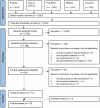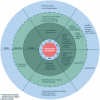Influence of Freedom of Movement on the Health of People With Dementia: A Systematic Review
- PMID: 35930355
- PMCID: PMC10474594
- DOI: 10.1093/geront/gnac114
Influence of Freedom of Movement on the Health of People With Dementia: A Systematic Review
Abstract
Background and objectives: To protect residents with dementia from harm, nursing homes (NHs) often have closed-door policies. However, current research suggests a positive influence of freedom of movement, that is, the right to (decide to) independently move from one place to another, on the health of NH residents with dementia. This systematic review aims to collate, summarize, and synthesize the scientific evidence published to date on the influence of freedom of movement on health among NH residents with dementia.
Research design and methods: Multiple databases were searched up until March 2021. Peer-reviewed qualitative, quantitative, and mixed methods studies were included. Health was operationalized using the Positive Health framework, encompassing 6 dimensions: bodily functions, mental functions and perception, existential dimension, quality of life, social and societal participation, and daily functioning. The quality of included studies was assessed using the Mixed Methods Appraisal Tool.
Results: Sixteen studies were included of good to excellent quality. Compared to closed NHs, freedom of movement in semiopen and open NHs may have a positive influence on bodily functions, mental functions and perception, quality of life, and social and societal participation. The influence on daily functioning and on the existential dimension remains unclear.
Discussion and implications: Freedom of movement of NH residents with dementia is often studied as part of a larger context in which other factors may contribute to health benefits. More research is therefore needed to unravel the underlying mechanisms of the positive influence of freedom of movement on health.
Keywords: Liberty; Locked; Nursing home; Positive Health.
© The Author(s) 2022. Published by Oxford University Press on behalf of The Gerontological Society of America.
Conflict of interest statement
None declared.
Figures


References
-
- Aros, M. (2018). Challenging tradition: Unlocking the DSU. Australian Journal of Dementia Care, August/September 2018, 7(4). https://journalofdementiacare.com/challenging-tradition-unlocking-the-dsu/
Publication types
MeSH terms
LinkOut - more resources
Full Text Sources
Medical

